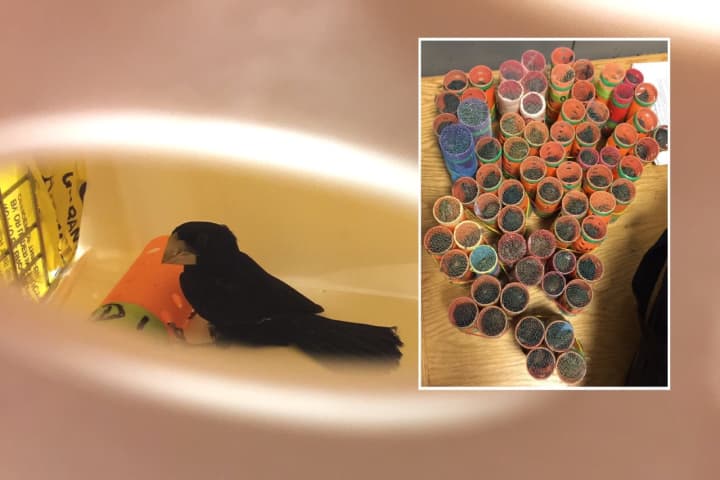The answer: Singing competitions.
U.S. Customs and Border Protections reported seizing 29 of the petite black-market songbirds this past weekend.
It's happened before -- and not just at New York/New Jersey area airports. Last year, hundreds were discovered at no fewer than 16 airports nationwide, although COVID-19 likely curbed the number, CBP said.
The 2019 total was 2,117.
Nearly all come from Guyana, where birdsong competitions are a significant part of the culture.
Most Guyanese living in America are in New York City, making them its fifth-largest foreign-born population . They’re also concentrated in Irvington, East Orange and Rockland County.
Federal law requires a 30-day quarantine to make sure that transported birds don’t carry avian flu or Newcastle disease, which can infect humans and domestic poultry, federal authorities say.
So the smugglers find work. And curlers seem to be the most popular vessel.
Prized like racehorses, the finches are lured by seeds and birdsong into Guyanese traps.
They're smuggled here and sell, on average, for $3,000 each, with the more talented fetching up to $5,000, authorities say.
Although their species aren't endangered, finch smuggling is the kind that federal officials say could bring a new wave of the avian flu stateside.
An avian flu outbreak in 2015 killed or took more than 50 million commercial turkeys and laying hens out of the market – for a loss estimated at more than $1 billion.
The birds were discovered during a secondary baggage check at the Queens airport, Customs officials said.
CBP turned the finches over to the federal Department of Agriculture Veterinary Services. The 26-year-old traveler was fined $300, not charged criminally and sent on his way back to Guyana.
“Customs and Border Protection officers and agriculture specialists face a very complex and challenging task and that is to protect our nation, our citizens, our agricultural resources and our economic security, and they meet that challenge with extraordinary commitment and vigilance,” said Marty C. Raybon, the acting director of field operations for CBP’s New York Field Office.
“CBP agriculture specialists have extensive training and experience in the biological sciences and agricultural inspection,” the agency wrote. “They examine international trade shipments and traveler baggage every day in the search for invasive insects, federal noxious weeds, and plant and animal diseases that could have a serious impact on our national agricultural resources.
“During a typical day last year, CBP agriculture specialists across the nation seized 3,091 prohibited plant, meat, animal byproducts, and soil, and intercepted 250 insect pests at U.S. ports of entry.”
Click here to follow Daily Voice Fort Lee and receive free news updates.


